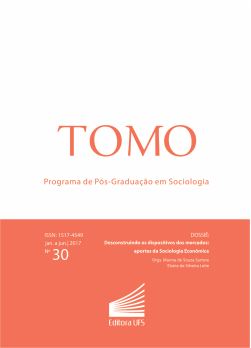The role of the prescription and judgment devices on the working of the markets: the forest certification case
DOI:
https://doi.org/10.21669/tomo.v0i0.6715Abstract
One of the most highlighted aspects by contemporary economic sociology is the role played by social relations, material devices, rules and cultural meanings in the markets’ construction and functioning process. According to these approaches, for the trade exchange to function it is necessary to solve something that main- stream economic theory disregards, the matter of the uncertainty about products’ quality. To answer this question, some approach- es draw attention to the role played by judgment or prescription devices on markets. This papers aims to discuss the role of these judgment devices on the certified timber markets, considering its’ role as prescribers, namely, as devices that act in the sense of de- fining relations between sellers and different competitors. How- ever, rather than supposing these intermediary act to solve the question of the opacity of mercantile trade, we adopt the perspec- tive that these prescribers act as interested parties in the build- ing of the market, that is, although the certification device being analyzed presenting itself as a third party between the different interests in play on the field of forest industry, having a relative impartiality, it ends by favoring the success of a certain kind of forest company or of a certain form of forest activity coordination.Downloads
Downloads
Published
How to Cite
Issue
Section
License
TOMO journal adopts the Creative Commons CC-BY 4.0 license which allows:
• Share: copy and redistribute the material in any medium or format.
• Adapt: remix, transform, and create from the material for any purpose, even commercial.
Authors who publish in this journal agree to the following terms:
a) Authors retain copyright and grant the journal the right of first publication, with the work simultaneously licensed under the Creative Commons which allows sharing the work with acknowledgment of authorship and initial publication in this journal.
b) Authors are authorized to assume additional contracts separately, for non-exclusive distribution of the version of the work published in this journal (eg, publishing in an institutional repository or as a book chapter), with acknowledgment of authorship and initial publication in this journal.
c) Authors are allowed and encouraged to publish and distribute their work online (e.g., in institutional repositories or on their personal page) at any point before or during the editorial process, as this can generate productive changes, as well as increase the impact and citation of the published work (O Efeito do Acesso Livre).







